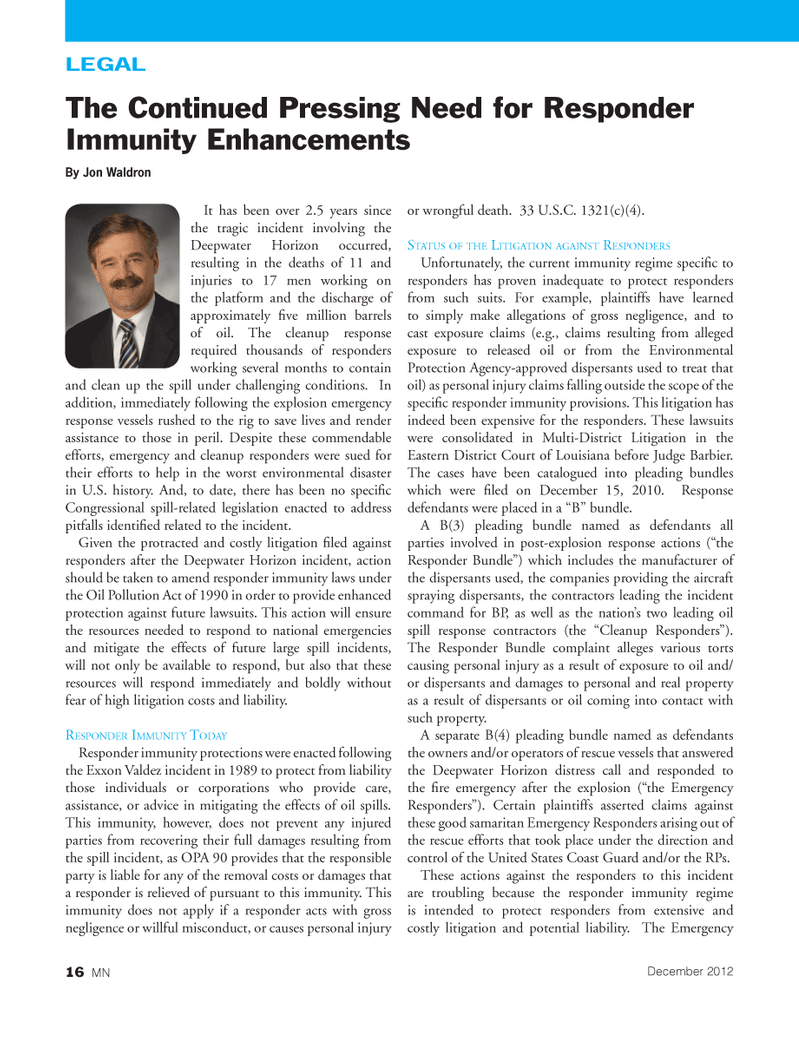
Page 16: of Marine News Magazine (December 2012)
Innovative Products &
Read this page in Pdf, Flash or Html5 edition of December 2012 Marine News Magazine
It has been over 2.5 years since the tragic incident involving the Deepwater Horizon occurred, resulting in the deaths of 11 and injuries to 17 men working on the platform and the discharge of approximately Þ ve million barrels of oil. The cleanup response required thousands of responders working several months to contain and clean up the spill under challenging conditions. In addition, immediately following the explosion emergency response vessels rushed to the rig to save lives and render assistance to those in peril. Despite these commendable efforts, emergency and cleanup responders were sued for their efforts to help in the worst environmental disaster in U.S. history. And, to date, there has been no speciÞ c Congressional spill-related legislation enacted to address pitfalls identiÞ ed related to the incident. Given the protracted and costly litigation Þ led against responders after the Deepwater Horizon incident, action should be taken to amend responder immunity laws under the Oil Pollution Act of 1990 in order to provide enhanced protection against future lawsuits. This action will ensure the resources needed to respond to national emergencies and mitigate the effects of future large spill incidents, will not only be available to respond, but also that these resources will respond immediately and boldly without fear of high litigation costs and liability. RESPONDER IMMUNITY TODAY Responder immunity protections were enacted following the Exxon Valdez incident in 1989 to protect from liability those individuals or corporations who provide care, assistance, or advice in mitigating the effects of oil spills. This immunity, however, does not prevent any injured parties from recovering their full damages resulting from the spill incident, as OPA 90 provides that the responsible party is liable for any of the removal costs or damages that a responder is relieved of pursuant to this immunity. This immunity does not apply if a responder acts with gross negligence or willful misconduct, or causes personal injury or wrongful death. 33 U.S.C. 1321(c)(4). STATUS OF THE LITIGATION AGAINST RESPONDERSUnfortunately, the current immunity regime speciÞ c to responders has proven inadequate to protect responders from such suits. For example, plaintiffs have learned to simply make allegations of gross negligence, and to cast exposure claims (e.g., claims resulting from alleged exposure to released oil or from the Environmental Protection Agency-approved dispersants used to treat that oil) as personal injury claims falling outside the scope of the speciÞ c responder immunity provisions. This litigation has indeed been expensive for the responders. These lawsuits were consolidated in Multi-District Litigation in the Eastern District Court of Louisiana before Judge Barbier. The cases have been catalogued into pleading bundles which were Þ led on December 15, 2010. Response defendants were placed in a ÒBÓ bundle. A B(3) pleading bundle named as defendants all parties involved in post-explosion response actions (Òthe Responder BundleÓ) which includes the manufacturer of the dispersants used, the companies providing the aircraft spraying dispersants, the contractors leading the incident command for BP, as well as the nationÕs two leading oil spill response contractors (the ÒCleanup RespondersÓ). The Responder Bundle complaint alleges various torts causing personal injury as a result of exposure to oil and/ or dispersants and damages to personal and real property as a result of dispersants or oil coming into contact with such property. A separate B(4) pleading bundle named as defendants the owners and/or operators of rescue vessels that answered the Deepwater Horizon distress call and responded to the Þ re emergency after the explosion (Òthe Emergency RespondersÓ). Certain plaintiffs asserted claims against these good samaritan Emergency Responders arising out of the rescue efforts that took place under the direction and control of the United States Coast Guard and/or the RPs. These actions against the responders to this incident are troubling because the responder immunity regime is intended to protect responders from extensive and costly litigation and potential liability. The Emergency LEGALThe Continued Pressing Need for Responder Immunity Enhancements By Jon Waldron 16 MNDecember 2012

 15
15

 17
17
